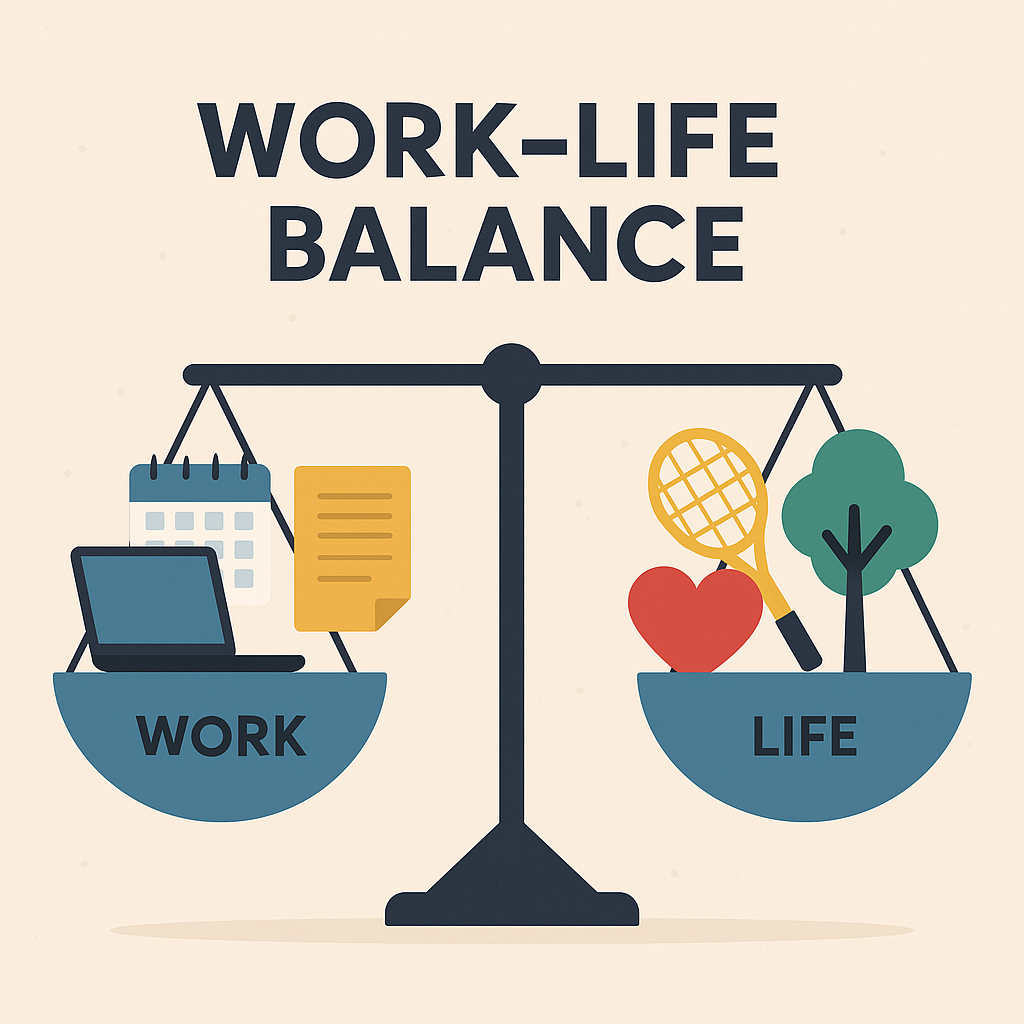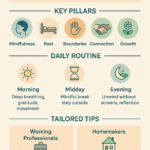You wake up with a long to-do list. Emails are waiting. Meetings are stacked. Somewhere in between, you’re supposed to eat well, stay fit, spend time with loved ones, and maybe even rest. But by the end of the day, you’re running on fumes, again.
Sound familiar?
If you’ve ever felt like work is bleeding into every part of your life, you’re not alone. Whether at the office from 9 to 5 or working from home in your pajamas, the pressure to “do it all” can leave you exhausted and overwhelmed.
But here’s the good news: you don’t have to live like that.
Work-life balance isn’t just a buzzword, it’s a choice – a skill. And with the right habits, it’s something you can build for yourself, even in the busiest seasons.
This guide will explain what work-stress management really means, why it matters, and how you can take small, powerful steps to create more peace, energy, and joy in your everyday life.

What Is Work-Life Balance?
A healthy work-life integration allows you to manage your job and personal life without feeling overwhelmed. It means having time to meet professional commitments while nurturing mental wellness, personal relationships, and overall happiness.
It doesn’t mean every day is perfectly split 50/50. Some days, work may take the lead. On other days, your family or self-care needs more attention. What matters is having the flexibility and space to shift between both without guilt or exhaustion.
Signs You Have an Unbalanced Work-Life:
– You check emails late into the night.
– Skip meals or workouts because of meetings.
– You feel guilty while taking some time off.
– You constantly feel behind, at work and home.
If this sounds like you, don’t worry. The first step is awareness, and the good news is: that you can reclaim control over your daily routine and stress levels.
Why is Work-Life Balance Important?
Creating balance in your day is not just about feeling less tired. It has deep effects on your health, performance, and overall happiness.
Let’s look at how it can change your life:
1. Improved Physical & Mental Health
Chronic stress takes a toll on your body. Overworking can cause headaches, poor sleep, and even heart issues. But when you adopt stress management techniques and set better boundaries, your body gets the rest it needs. Also, you will feel more mentally calm and in control.
2. Increased Productivity
People often think working more hours equals more results. However, studies show the opposite: well-rested people get more done in less time. When your mind is clear and focused, your efficiency skyrockets.
3. Reduced Stress & Burnout
When you carve out time for breaks, sleep, and fun, your nervous system has a chance to reset. This keeps long-term burnout away and helps you stay emotionally steady.
4. Better Personal Relationships
Your loved ones want you, not the tired, overworked version of you. When you make time for quality moments, your connections grow stronger.
5. Greater Job Satisfaction
When your personal needs are met, your work feels more fulfilling too. You’ll show up with more energy, creativity, and purpose.
How to Achieve Healthy Work-Life Balance: 9 Practical Steps
You don’t need a complete life overhaul to feel more balanced. Just a few small changes can help you build momentum.
Here’s a step-by-step guide you can start using right away:
1. Set Clear Boundaries Between Work and Life
You can start by setting a standard ‘work hours’ and sticking to them. If you’re working from home, this is especially important.
Try This:
– Set an alarm to mark the end of your workday
– Turn off work notifications after hours
– Use a separate browser or phone for work tasks
Boundaries help your brain shift from “work mode” to “rest mode.”
2. Take Breaks Throughout the Day
Don’t power through eight hours straight. Your brain needs regular pauses to stay sharp.
Try This:
– Follow the Pomodoro Technique: 25 minutes work + 5-minute break
– Stretch every hour
– Step outside and get some fresh air for a few minutes
These small breaks reduce eye strain, increase focus, and boost creativity.
3. Schedule Time for Your Hobbies and Interests
Make time for joy. Whether it’s painting, dancing, playing an instrument, or gardening, do more of what makes you feel alive.
Try This:
– Block off “me time” on your calendar each week
– Protect it like any other meeting
– Start small, just 15–30 minutes a day can make a difference
4. Delegate Tasks When Possible
You don’t have to do everything. Whether it’s house chores, work tasks, or errands, ask for help.
Try This:
– At work: delegate admin or repetitive tasks
– At home: share responsibilities with family members
– Consider using digital tools or apps to automate tasks
Entrusting others is a smart strategy, not a weakness.
5. Say No to Extra Work
Not every opportunity is worth your peace. Learn to say no without guilt.
Try This:
– “I’d love to help, but I don’t have enough time.”
– “I need to focus on existing commitments right now.”
Protect your time like it’s your most valuable asset because it really is.
6. Take Real Vacations
A weekend off is great, but real rest takes time. Don’t just save your vacation days, use them.
Try This:
– Unplug from work emails during holidays
– Plan a staycation if travel isn’t possible
– Create “no work zones” during your trip
Vacations are not a luxury, they’re a necessity.
7. Practice Relaxation Techniques
Daily stress management can help you feel calm and collected, even on busy days.
Try This:
– Deep breathing or meditation (apps like Calm or Headspace help!)
– Journaling at night helps to clear your mind
Even five minutes a day can shift your entire mood.
8. Consider Hiring a Virtual Assistant or Support Team
Feeling overwhelmed by your workload? It might be time to outsource.
Try This:
– Hire a virtual assistant to handle emails, scheduling, or customer service
– Get help with bookkeeping, editing, or admin tasks
– Use platforms like Persona to find trustworthy remote help
Freeing up even a few hours per week can give you more room to breathe, and live.
9. Seek Professional Help If Needed
If stress, anxiety, or burnout is affecting your health or mindset, don’t go it alone.
Try This:
– Speak to a counselor or therapist
– Join a support group
– Talk to your HR department about employee wellness programs
There’s no shame in asking for help. Well, it is one of the strongest things you can do.
Create Your Personalised Work-Life Balance Plan
Balancing work-life isn’t a one-size-fits-all thing. What works for you might not work for your colleagues. The key is to figure out what you need to feel grounded, happy, and productive.
Here’s how to start:
1. Identify your biggest energy drainers (meetings, emails, chores?)
2. List the activities that refill your energy (exercise, time with loved ones, quiet time?)
3. Build your weekly routine around balance, not just tasks.
Make space for breaks. Make space for joy. And make space for rest.
Final Thoughts
You don’t need to hustle 24/7 to prove your worth. You don’t have to suffer in situations where you need to choose between success and sanity.
By setting clear boundaries, making time for rest, and letting go of what no longer serves you, you can build a life that feels good on the inside, not just impressive on the outside.
So take a deep breath. Start small. And know that a more balanced life is not just possible, it’s waiting for you.
Struggling with work-life balance?
- Choose one tip from this article and commit to trying it this week.
- Share this with a friend or coworker who needs it.
- Save it to return to whenever life feels a little too heavy. Also, share your experience in the comments.
Frequently Asked Questions (FAQs)
It means having time for both your job and your personal life without feeling stressed or overwhelmed. It’s about managing work and resting healthily.
Good balance helps you feel calm and clear-headed. Poor balance can lead to stress, anxiety, and burnout.
It keeps you healthy, happy and focused. When you balance work and life, you do better at both.
You can set work hours, take breaks, rest more, and say no to extra tasks. Small changes make a big difference.
When employees feel rested and happy, they work faster, smarter, and make fewer mistakes.
Start by making time for yourself. Set clear work hours, take care of your health, and ask for help when needed.
Plan your day better. Take time for hobbies, say no to too much work, and ask for support at work or home.
Yes! You can grow in your career without giving up your personal time. Balance helps you stay strong and focused for the long run.
These are programs or policies by companies to help workers rest and recharge. Examples include remote work, flexible hours, or mental health days.
No. Taking care of your life and health is a strength. It helps you do better at work and feel better in life.
Reference:
https://www.who.int/news/item/28-05-2019-burn-out-an-occupational-phenomenon
https://hbr.org/2019/03/the-productivity-paradox-working-more-means-getting-less-done
https://www.apa.org/monitor/2023/10/flexible-work-employee-well-being


